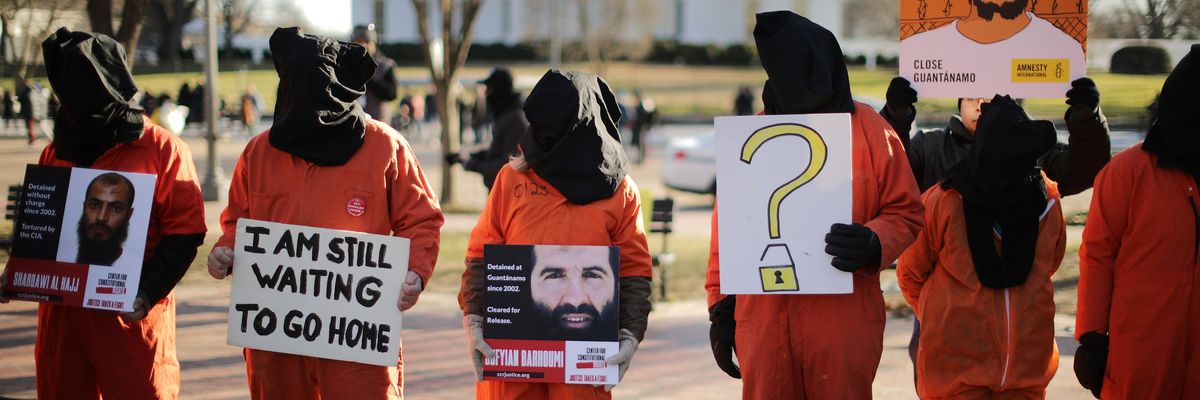Human rights defenders marked 22 years since the opening of the U.S. military prison at Guantánamo Bay, Cuba with renewed calls for President Joe Biden to fulfill his stated intention to close the notorious torture camp, where 30 men—16 of them cleared for release—remain behind bars.
Like most of the roughly 750 prisoners released from Guantánamo, the majority of remaining detainees have never been charged with any crime. Only one—Ali Hamza Ahmad Suliman al-Bahlul, a Yemeni national—has ever been convicted of terrorism-related charges under the highly controversial military commission regime established by the George W. Bush administration in the wake of the September 11, 2001 attacks on the United States.
"It is outrageous that 22 years after the U.S. government opened the Guantánamo detention camp to detain Muslim men beyond the reach of U.S. law, that this abuse of human rights continues today," Daphne Eviatar, director of the Security with Human Rights program at Amnesty International USA, said in a statement.
Four American presidents have failed to close Gitmo, whose detainees ranged in age from 13 to 74 and which is viewed globally as a symbol of the indefinite detention and torture that took place earlier during the ongoing U.S.-led War on Terror. Former President Barack Obama—under whom Biden served as vice president—issued executive orders immediately after taking office in 2009 that were meant to end torture and close Gitmo. However, Obama was blocked by Congress from proceeding with his plan to close the prison, frustrating his campaign promise. Obama was also accused of breaking the law by actively shielding Bush-era officials from facing justice for their roles in torture at Gitmo and other military prisons and CIA so-called "black sites."
Shortly after Biden took office, the White House signaled it wanted to close Guantánamo. However, despite releasing 10 detainees, the administration has taken few steps toward achieving that goal and has spent millions of dollars expanding the facility by building a courtroom where prisoners are meant to be tried in secret.
However, the military commissions—which former lead prosecutor Col. Morris Davis called "rigged from the start"—have been stymied by the torture endured by defendants at the hands of military and CIA operatives. Military judges have barred Guantánamo detainees or evidence in terrorism cases from the courtroom due to torture.
This has been a major impediment to bringing terrorism suspects to justice. For example, Col. Stuart Crouch, a Guantánamo prosecutor whose Marine Corps buddy was a pilot on one of the planes that crashed into the World Trade Center on 9/11, refused to prosecute Mohamedou Ould Slahi—who allegedly helped organize the plane's hijacking—because Ould Slahi was tortured.
In another example, seven out of eight members of a Guantánamo military jury convened to hear the case against alleged terrorist plotter Majid Khan in 2021 recommended total clemency after the defendant testified how he endured torture including rape, being hung from a ceiling beam, and being subjected to the interrupted drowning method known as waterboarding while he was held at a CIA "black site" in Afghanistan.
Davis and at least four other military prosecutors requested and were granted removal from the military commissions because they felt the proceedings were unfair and marred by torture.
Among the Guantánamo detainees cleared for release are "forever prisoner" Abu Zubaydah, who has been imprisoned at Gitmo for 21 years without charge and was the first known victim of waterboarding.
"More than half of those who remain are men the United States itself does not believe need to be detained," the Center for Constitutional Rights—which represents some Guantánamo detainees—said in a statement Thursday. "The fact that they continue to languish after two decades is a cruelty that could end tomorrow."
"The Biden administration needs no new authority or ideas," the group added. "All it needs is the political will and a willingness to do the work."
Biden is seeking reelection this year and the leading Republican candidate is former President Donald Trump, who signed an executive order to keep Guantánamo open while threatening to fill the camp with "some bad dudes," although he did not transfer anyone to the prison.
On Tuesday, scores of rights groups published an open letter urging Biden to permanently close Gitmo.
"Whether Guantánamo and its injustices continue or—as you promised—end, will be a defining part of your legacy and this pivotal year of your presidency may be the last chance at closing it," the letter states. "It is long past time for a meaningful reckoning with the full scope of damage caused by U.S. policies in response to 9/11 and through the so-called 'War on Terror.'"
"Closing Guantánamo, ending indefinite military detention of those held there, and never again using the military base for unlawful mass detention of any group of people are necessary steps towards those ends—and to combating dehumanizing and Islamophobic narratives," the signers added. "We urge you to act without delay, and in a just manner that considers the harm done to the men who have been imprisoned without charge or fair trials for over two decades."

